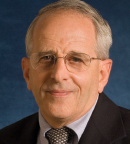
Deborah Schrag, MD

Stuart A. Grossman, MD
Formal discussant of this trial Stuart A. Grossman, MD, of the Sidney Kimmel Comprehensive Cancer Center at Johns Hopkins University, Baltimore, commented that the trial did not include a best standard-of-care arm. The pivotal trial defined optimal radiotherapy as 60 Gy over 6 weeks, but this study used a 50% reduction in radiation fraction, as well as a 50% reduction in the administered dose of temozolomide. “This leaves us with concern of possible undertreatment,” Dr. Grossman remarked.
“There is a hidden pearl in this study. MGMT (O6-methylguanine-methyltransferase) methylation status is critically important in determining which treatment to offer patients. It is clear that if an elderly patient’s tumor is methylated, emphasis should be placed on temozolomide,” he stated.
He also said that the definition “elderly” is “soft.” Fit patients over the age of 70 can benefit from the same treatment as patients younger than age 70.
Value of Care
The final speaker at the plenary session, Deborah Schrag, MD, of the Dana-Farber Cancer Institute, Boston, discussed the value of radiotherapy and temozolomide. From a health-system perspective, she deemed temozolomide for the treatment of glioblastoma as moderate value, based on ASCO and the European Society for Medical Oncology value frameworks. In the absence of a specific mutation (MGMT promoter methylation), temozolomide is of low value, she noted. However, generic temozolomide is also available, and in a high-income country such as the United States, the treatment is likely to be used, she added. ■
Disclosure: Drs. Grossman and Schrag reported no potential conflicts of interest.

